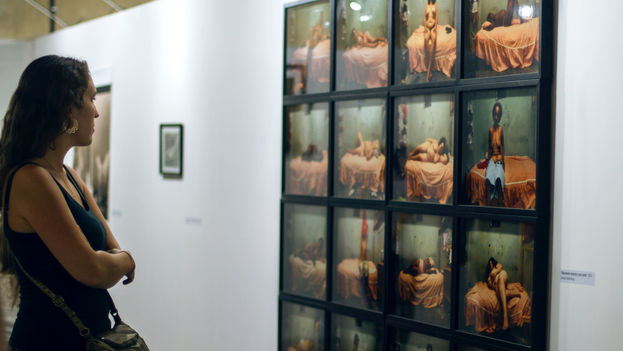
![]() 14ymedio, Generation Y, Yoani Sanchez, 8 March 2017 – Lying in bed, with the light off, feeling each one of her vertebrae howling. After coming home from work she spent four hours in the kitchen, bathed her invalid mother, helped the children with their homework, went shopping and prepared an administrative report. On TV the announcers offer congratulations for the Day of the Woman, but it sounds like a distant echo that does not influence her life.
14ymedio, Generation Y, Yoani Sanchez, 8 March 2017 – Lying in bed, with the light off, feeling each one of her vertebrae howling. After coming home from work she spent four hours in the kitchen, bathed her invalid mother, helped the children with their homework, went shopping and prepared an administrative report. On TV the announcers offer congratulations for the Day of the Woman, but it sounds like a distant echo that does not influence her life.
On March 8, the workplaces end their days earlier, the officials intone mellow speeches and all the stands are sold out of flowers. The news is filled with images of women who cut cane, give life to babies, and carry guns on their shoulders. Nor is there any lack of politics. Officialdom takes advantage of the day to insist that only “after January 1959” have we Cuban women been recognized.
There are no protest marches, no demands expressed, as if the life of women in this country was a bed of roses
The National Symphonic Orchestra prepares a special concert, the Post Office sells postcards in bad taste, while the Cuba Workers Center – the only legal union in the country – dedicates the day to Fidel Castro and the “eternal president of the Federation of Cuban Women,” Raul Castro’s late wife Vilma Espín Guillois. There are no protest marches, no demands expressed, as if the life of women in this country was a bed of roses.
The noise of the music, the slogans and the triumphalism drown out our complaints. The day, made compulsorily festive, does not allow demands to emerge, nor talk – with bras shed – about the problems that threaten our daily lives. “Today is a day for celebration, not complaining,” many say; but tomorrow other topics will fill the agenda and there will never be “a good time” to talk.
Symptomatically, the initiative of a women’s strike under the slogan #NosotrasParamos (We Stop) does not find space here, although 45 countries have joined the protests to demand equality between men and women. The lack of independence of women’s associations and their subordination to the government prevents the idea of our taking to the streets with posters and demands.
Machismo and gender discrimination fill every space of our daily lives. In the media, a catchy children’s song tells the story of mother ant who urges her daughter to abandon her games and help her iron, sweep and scrub; but the capricious little girl prefers her dolls. In schools, teachers prepare an area of pink kitchens and baby beds for the girls to play in, while they reserve trucks and play weapons for the boys. In workplaces, bosses feel the power to compliment, harass and touch their subordinates, often under the belief that “they like it.”
Power continues to maintain its old-fashioned, cheesy machismo, purportedly “chivalrous”, which veers from flattery to insult towards those in skirts
In the official discourse we are seen as decorative elements, as a necessary gender quota or simple pieces of the ideological gears. Power continues to maintain its old-fashioned, cheesy machismo, purportedly “chivalrous,” which veers from flattery to insult towards those in skirts. The woman who shares their ideology is a “beautiful flower of the Revolution,” the dissident only deserves that hard four-letter word that questions our morality.
The Cuban feminist movement is dead. This system was killed by depriving it of autonomy, extinguishing the discourse of demands and imposing the false premise that women emancipated themselves five decades ago. All a fallacy that hides the drama of millions of women condemned to double or triple working hours, subjected to sexual harassment and surviving every day with a dose of antidepressants.
The entire economic crisis that we have experienced has claimed women as its main victims. The shortages force them into the long lines to buy food and the stress, every day, of having to “invent” a meal. The accelerated emigration has separated them from their children and the layoffs at state workplaces have returned them to the house, back to the hearth.
Where are the figures for the number of women murdered or beaten by their partners? Where can harassed wife who fears the next beating take shelter?
Statistics about women professionals, deputies to the National Assembly, scientists in white coats or athletes, cannot hide the other side. The numbers of battered women, threatened by a boyfriend who has sworn to kill them if he sees them with another, those raped inside or outside of marriage or those who have had to exchange sex for promotions at work.
Where are the figures for the number of women murdered or beaten by their partners? Where can harassed wife who fears the next beating take shelter? Why not talk about femicide in the national media if each of us knows at least some case where a macho rage ended a life?
Today is not a day to celebrate, but to worry. A day of demands that have been extinguished by the music of a machismo reluctant for us to have our own voice.
